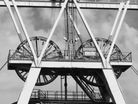Poland mining safety under scrutiny after six fatalities

Poland's Prime Minister Mateusz Morawiecki has promised to investigate safety standards at Poland's mining pits after two incidents led to six fatalities.
In the latest statement from Jastrzebie Coal Group (JSW), rescue workers continue to search for six miners with whom contact was lost after the shockwave in Zofiówka.
"The conditions in the endangered area are challenging. High methane concentrations and the high temperature are effectively slowing down the rescue operation," it states.
"The rescue workers are working in oxygen tanks to reestablish a separate ventilation system whereby the atmosphere in the mining roadway would make it possible to search for the miners more intensively," adding they have approximately 200 metres to go to the mine face.
On Saturday, it was reported a shockwave combined with an intensive methane discharge took place in the Zofiówka Section of the Borynia-Zofiówka mine in the D4a face at the 900m level.
Andrzej Duda, President of Poland, visited the Zofiówka Section in connection with JSW’s second mining catastrophe this week. He met with the JSW Management Board and the mine’s management team.
“I had not expected that I would be here in Jastrzębie-Zdrój again literally within some fifty hours in connection with the occurrence of another catastrophe”, he said. “The experts explained to me that there is no connection between these two events. Quite simply, this is only a coincidence."
An investigation is underway to determine if both incidents were a coincidence or whether there was any negligence which could indicate more systemic safety failures in Poland's mining industry.
Last month JSW outlined how it intends to strengthen its "leading position in the coking coal and coke sales market in Europe" by increasing mining output from 13.8mn tons in 2021 to 16.1mn tons by 2030, and placing "a strong emphasis on environmental protection", aiming to reduce its carbon footprint by 30% by 2030 and achieving carbon neutrality by 2050. The strategy made no reference to safety.
According to the German think tank Ember, 70% of methane leaks from Europe’s active coal mines, take place in Poland (click here).
Polish coal mines are also among the largest methane emitters after Russia and Kazakhstan. The lignite power plant in Belchatow is widely regarded as the largest single air polluter in Europe, having emitted 38.3mn metric tons of C02 into the atmosphere in 2018.
The mine was responsible for the equivalent of 56.7mn tons of CO2 due to methane leaks.
- IEA: Why Lithium Battery Demand Puts Pressure on MiningSupply Chain Management
- How Sandvik & Atlas Salt Deal Will Make US Roads SaferSourcing & Procurement
- How Did Iron Ore and Nickel Giant Vale Perform in 2025?Supply Chain & Operations
- Mexico's Move to Build Critical Minerals Supply ChainsSupply Chain & Operations



